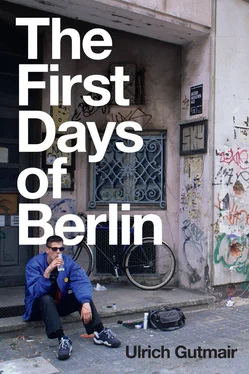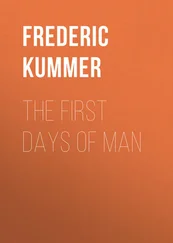‘We couldn’t do this in London or any of the other cities we come from. That’s why this is happening in Berlin’, a reddish-haired Brit says.
His American mate says, ‘None of what we’re doing here is forever. Whatever you do in life, it’s only ever temporary.’ But Tacheles is more than a squat. ‘It’s a monument to the East German squatter movement.’
The Tacheles squatters bought cigarettes from Serdar Yildirim, and he made friends with some of them. From time to time, he would have a beer at Café Zapata after work.
‘Once, when I was taking a taxi home at four in the morning, I saw Klaus outside the shop. He’d set up his stall and was just sitting there. The weather made no difference to him. I had an awning and so if it rained, he’d move his stand over to the side of the shop where he wouldn’t get wet.’
Serdar says that Klaus Fahnert used to sleep in an empty plot just around the corner in Torstrasse.
‘That’s where he used to store his books. He would comb skips for books and old lamps. He didn’t really sell them. He gave a lot of things away. Many people donated a few marks or bought him a beer. Begging wasn’t his style. He was very popular in the street, and all the kids knew him. He often ate at the snack stand, and lots of people, not just people from the bakery or the pizzeria on the corner, used to give him food. Almost every day, the nice waitress from the German pub opposite would bring him something to eat, with sauerkraut and potatoes, all wrapped up. Klaus talked to people, and lots of people liked talking to him. He was no idiot. He was pretty smart actually. He’d talk politics. His nickname was “Mr Mayor”. Joschka Fischer often came here to buy something in his funny hat.’
Joschka Fischer, the former agitator of a fairly unsuccessful attempt to organize workers at the Opel car factory in Rüsselsheim, a militant member of the Revolutionärer Kampf group in Frankfurt, taxi driver, translator and actor, was vice chancellor and foreign minister of the Federal Republic of Germany when he stopped off for something at Serdar’s kiosk in the early 2000s. He lived in Tucholskystrasse. His building was three minutes by foot heading down Oranienburger Strasse from the kiosk towards the synagogue.
‘He knew Klaus and would always chat to him for quite a while. That’s why I like Joschka Fischer – he didn’t look down his nose at people’, Serdar says. ‘He always had a look at the books Klaus had and would often buy something. Whether he read them is another matter.’
Klaus Fahnert liked wearing badges on his lumberjack shirts. A TV reporter was struck by one saying ‘Stop Stoiber’ two days before the federal elections in September 2002 when Edmund Stoiber, the head of the Bavarian Christian Social Union party, was trying to dislodge the incumbent red–green government led by Gerhard Schröder and Joschka Fischer. Since Klaus was supposed to represent the homeless people of Mitte in her report and was displaying political messages, the journalist asked if he voted. To which Klaus’s answer was: ‘Your princes are rogues and layabouts. I would abhor voting for you.’ These are the only words ever spoken by Klaus Fahnert that show up on the internet.
There’s a photo of Klaus hanging right next to the door of Serdar’s new kiosk.
‘Klaus was actually quite happy with his life’, Serdar says. ‘But you know how it ended?’
A homeless man dying, a kiosk vanishing from urban landscape: these are events of no interest to historians. Cities are sites of constant change. People die all the time. Other people get out of cars, trains and planes and seek their place in the city. Some spend a weekend partying in Berlin’s clubs. Some buy a flat and go home again – back to Stuttgart, to the prosperous shores of Lake Starnberg, to Milan, Barcelona or Stockholm. Some stay for a while, others stay for good. When larger communities arrive, such as the Huguenots, the Jews or the Turks, they change the face of the city. The fact that guys like Klaus are part of city life too is an insufficient reason to study them, apparently. It is symptomatic, however, that there used to be space for someone like Klaus in the middle of a city, and yet that space no longer seems to exist.
For many first-hand witnesses to the breakneck pace of change after the fall of the Wall, the transformation formed a significant part of their life stories, but they also found it an odd experience. It’s uncanny living in a city you could tell many stories about if only you could mould them into a narrative.
That was Brad’s experience (full name Sung-Uk Bradden Hwang). In 1990 this art student, who grew up in rural Utah, moved from Los Angeles to Berlin, where he didn’t know a soul. He had no money and he didn’t speak German. Brad used junk to build gadgets whose function was determined by the meaning observers ascribed to them. He viewed his artworks as gifts: ‘Giving away the very things you don’t have to people who can’t pay for them.’
Brad constructed a potato-waffle-throwing machine from a trolley normally used for transporting bottles of welding gas. He made a portable lightning machine. For Café Zapata at Tacheles he built ‘The Singing, Soup-Cooking Heating System’ out of steel barrels, its secondary function being to heat the café. A reporter from Der Spiegel noted in 1991 that the artwork created something of a stir. When the journalist asks him why he came to Berlin, Brad doesn’t understand the question. ‘Hier isset, man’ (‘This is where it’s at, man’) is his comment – he’d picked up Berlin dialect and specific countercultural slang in record time. The new energy, unification – ‘It’s one helluva fix’, he says.
Twenty years on, Brad is still in Berlin. He, his wife and their two kids live on a houseboat called Odin . In 2011 he posted a text titled ‘Ghost Investigation’ online. In it he tries to explain why there is so little record of his work from the period after the Wall fell. His conclusion is that it wasn’t necessary.
‘When all’s said and done, we would collect food and junk in the mornings, visit friends before lunch (and scribble something on the door if they weren’t in) to talk about that day and the weather and everything else in life, make music for a bit around noon, hook up to the neighbours’ running hot water in the afternoons, cook a meal and eat together in the evenings, dance the nights away, sleep. The next day we would go looking for coal briquettes, queue up outside with a phone we’d found or borrowed to connect it to a recently discovered working line, organize or play at or go to a gig, paint or look at pictures, sleep for a bit longer the day after that, make music again or DJ, more cooking and eating, no hot water after all, try again.’ How are you meant to document all those things when artistic production is such an integral part of an unfathomable routine, Brad wonders. ‘No matter, tomorrow’s another day.’
He’s still haunted by the ghosts of the post-Wende years. ‘Where have Mayakovsky’s wonderful life or Beuys’s social sculptures gone? Where has the classless society gone? Didn’t something happen? We sensed the ghosts in the darkness, on the edges of our vision, again and again, in moments of upheaval and unrest, but we cannot grasp them. The normal strategy seems to be to explain them away. Atemporality should at last be recorded as history; at the end of the day, it’s the only thing we can embrace, archive, sell or forget.’ Brad Hwang quotes Octavio Paz: ‘Anyone who has looked hope in the eye will never be able to forget it. He will search for it wherever he goes.’ Brad Hwang thinks these ghosts wouldn’t haunt us if they didn’t have something important to whisper to us.
Читать дальше












